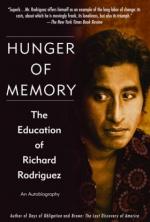|
This section contains 9,727 words (approx. 33 pages at 300 words per page) |

|
SOURCE: Staten, Henry. “Ethnic Authenticity, Class, and Autobiography: The Case of Hunger of Memory.” PMLA 113, no. 1 (January 1998): 103–16.
In the following essay, Staten explores the conflicts, contrasts, and flaws in Rodriguez's arguments on culture and cultural assimilation in Hunger of Memory.
I
When Hunger of Memory: The Education of Richard Rodriguez was published in 1982, it immediately became the center of a heated debate that has continued to the present. The book consists of a brief prologue and six loosely intertwined, loosely chronological autobiographical essays. In the prologue, “Middle-Class Pastoral,” Rodriguez declares himself a fully assimilated “middle-class American man” (3) and cautions against the “pastoral” impulse of the middle class (by which he apparently means the Mexican American middle class) to “deny its difference from the lower class” (6). The first essay, “Aria,” recounts how Rodriguez struggled to learn English as a child from a Spanish-speaking household, an experience from which he...
|
This section contains 9,727 words (approx. 33 pages at 300 words per page) |

|


